31.
in English.
அவன் பேசலாம் ஆங்கிலத்தில்.32.
அவன் பேச வேண்டும் ஆங்கிலத்தில். (கட்டாயம்/அழுத்தம்)
33.
He must not speak in English.
அவன் பேச வேண்டியதில்லை ஆங்கிலத்தில் (அழுத்தம்)
அவன் பேசக் கூடாது ஆங்கிலத்தில்.
34.
He should speak in English.
அவன் பேசவே வேண்டும் ஆங்கிலத்தில். (மிக அழுத்தம்)
35.
He shouldn’t speak in English.
அவன் பேசவே வேண்டியதில்லை ஆங்கிலத்தில். (மிக அழுத்தம்)
அவன் பேசவே கூடாது ஆங்கிலத்தில்.
36.
He ought to speak in English.
அவன் எப்படியும் பேசவே வேண்டும் ஆங்கிலத்தில். (மிக மிக அழுத்தம்)
37.
He doesn’t mind speak
ing in English.
அவனுக்கு ஆட்சேபனை இல்லை பேசுவதற்கு ஆங்கிலத்தில்.
38.
He has to speak in English.
அவன்/அவனுக்கு பேச வேண்டும் ஆங்கிலத்தில்.
39.
He doesn’t have to speak in English.
அவன்/அவனுக்கு பேச வேண்டியதில்லை ஆங்கிலத்தில்.
40.
He had to speak in English.
அவனுக்கு பேச வேண்டி ஏற்பட்டது ஆங்கிலத்தில்.
41.
He didn’t have to speak in English.
அவனுக்கு பேச வேண்டி ஏற்படவில்லை ஆங்கிலத்தில்.
42.
He will have to speak in English.
அவனுக்கு பேச வேண்டி ஏற்படும் ஆங்கிலத்தில்.
43.
He won’t have to speak in English.
அவனுக்கு பேச வேண்டி ஏற்படாது ஆங்கிலத்தில்.
44.
He needs to speak in English.
அவனுக்கு அவசியம் பேச வேண்டும் ஆங்கிலத்தில்.
45.
He needn’t to speak in English.
45.
He doesn’t need to speak in English.
அவனுக்கு அவசியமில்லை பேசுவதற்கு ஆங்கிலத்தில்.
46.
He seems to be speak
ing in English.
அவன் பேசுகின்றான் போல் தெரிகின்றது ஆங்கிலத்தில்.
47.
He doesn’t seem to be speak
ing in English.
அவன் பேசுகின்றான் போல் தெரிகின்றதில்லை ஆங்கிலத்தில்.
48.
He seemed to be speak
ing in English.
அவன் பேசுகின்றான் போல் தெரிந்தது ஆங்கிலத்தில்.
49.
He didn’t seem to be speak
ing in English.
அவன் பேசுகின்றான் போல் தெரியவில்லை ஆங்கிலத்தில்.
50. Speak
ing in English
is useful.
பேசுவது(தல்) ஆங்கிலத்தில் பிரயோசனமானது.
51.
Useless speak
ing in English.
பிரயோசனமில்லை பேசுவது(தல்) ஆங்கிலத்தில்.
52.
It is better to speak in English.
மிக நல்லது பேசுவது ஆங்கிலத்தில்.
53.
He had better speak in English.
அவனுக்கு மிக நல்லது பேசுவது ஆங்கிலத்தில்.
54.
He made her speak in English.
அவன் அவளை வைத்து பேசுவித்தான் ஆங்கிலத்தில்.
55.
He didn’t make her speak in English.
அவன் அவளை வைத்து பேசுவிக்கவில்லை ஆங்கிலத்தில்.
56.
To speak in English.
He is practicing.
பேசுவதற்கு ஆங்கிலத்தில் அவன் பயிற்சி செய்துக்கொண்டிருக்கின்றான்.
57.
He used to speak in English.
அவன் பழக்கப்பட்டிருந்தான் பேசுவதற்கு ஆங்கிலத்தில்.
58.
Shall I speak in English?
நான் பேசவா ஆங்கிலத்தில்?
59.
Let’s speak in English.
பேசுவோம் ஆங்கிலத்தில்.
60.
He feels like speak
ing in English.
அவனுக்கு நினைக்கின்றது பேசுவதற்கு ஆங்கிலத்தில்.
61.
He doesn’t feel like speak
ing in English.
அவனுக்கு நினைக்கின்றதில்லை பேசுவதற்கு ஆங்கிலத்தில்.
62.
He felt like speak
ing in English.
அவனுக்கு நினைத்தது பேசுவதற்கு ஆங்கிலத்தில்.
63.
He didn’t feel like speak
ing in English.
அவனுக்கு நினைக்கவில்லை பேசுவதற்கு ஆங்கிலத்தில்.
64.
He has been speak
ing in English.
சில காலமாக/கிட்டடியிலிருந்து அவன் பேசிக்கொண்டிருக்கின்றான் ஆங்கிலத்தில்.
65.
He had been speak
ing in English.
அன்றிலிருந்து/அக்காலத்திலிருந்து அவன் பேசிக்கொண்டிருந்தான் ஆங்கிலத்தில்.
66.
I see him speak in English.
எனக்கு தெரிகின்றது அவன் பேசுகிறான் ஆங்கிலத்தில்.
67.
I don’t see him speak in English.
எனக்கு தெரிகின்றதில்லை அவன் பேசுகிறான் ஆங்கிலத்தில்.
68.
I saw him speak in English.
எனக்கு தெரிந்தது அவன் பேசுகிறான் ஆங்கிலத்தில்.
69.
I didn’t see him speak in English.
எனக்கு தெரியவில்லை அவன் பேசுகிறான் ஆங்கிலத்தில்.
70.
If he speaks in English,
he will get a good job.
அவன் பேசினால் ஆங்கிலத்தில் அவனுக்கு கிடைக்கும் ஒரு நல்ல வேலை.
71.
If he doesn’t speak in English,
he won’t get a good job.
அவன் பேசாவிட்டால் ஆங்கிலத்தில் அவனுக்கு கிடைக்காது ஒரு நல்ல வேலை.
72.
If he had
spoken in English,
he would have got a good job.
அவன் பேசியிருந்தால் ஆங்கிலத்தில், அவனுக்கு கிடைத்திருக்கும் ஒரு நல்ல வேலை. (பேசவும் இல்லை கிடைக்கவும் இல்லை)
73.
It is time he spoke in English.
இது தான் நேரம் அவன் பேசுவதற்கு ஆங்கிலத்தில்.
கவனத்திற்கு:
1. உதாரணமாக மேலே இன்று நாம் கற்றப் பாடத்தில் முதலாவது வாக்கியத்தைக் கவனியுங்கள். அதில் “He speak
s in English” “என்றுள்ளது. அதில் “speak” எனும் சொல்லுடன் “
s” எழுத்தும் இணைந்து வந்துள்ளதை அவதானித்திருப்பீர்கள். அதாவது “Third Person Singular” சாதாரண நிகழ் காலத்தில்
He, She, It உடன் வரும் பிரதான வினைச்சொற்களோடு
s, es எனும் எழுத்துக்களும் இணைந்தே வரும் என்பதை மறவாதீர்கள்.
Third Person Singular “He, She, It: Infinitive + e, es” அட்டவணை பார்க்கவும்.
2. மற்றது “speak in English” எனும் வார்த்தை சில இலக்கங்களின் போது “speak
ing in English” என்று வந்துள்ளதை அவதானிக்கவும்.
Verb with + ing: 2, 8, 9, 10, 11, 12, 31, 37, 46, 47, 48, 49, 50, 51, 60, 61, 62, 63, 64, 65, 66, 67, 68, 69.
இவ்விலக்கங்களின் போது எப்பொழுதும் பிரதான வினைச்சொல்லுடன் “
ing” யும் இணைந்தே பயன்படும் என்பதை மனதில் வைத்துக்கொள்ளுங்கள்.
உதாரணம்:
speak in English
speak
ing in English. என்று “ing” யும் இணைந்து வரும்.
Homework:
He drive
s a car.
அவன் ஓட்டுகின்றான் மகிழூந்து.
She go
es to school.
அவள் போகின்றாள் பாடசாலைக்கு.
Sarmilan get
s up early morning.
சர்மிலன் எழுத்திருக்கின்றான் அதிகாலையில்.
Nithya come
s to the office.
நித்யா வருகின்றாள் அலுவலகத்திற்கு.
He apologize
s with her.
அவன் மன்னிப்பு கோருகின்றான் அவளிடம்.
My mother opens a current account.
எனது தாயார் திறக்கின்றார் ஒரு நடைமுறைக் கணக்கு.இவற்றை மேலே நாம் கற்றதைப் போன்று ஒவ்வொரு வாக்கியங்களையும் 73 வாக்கியங்களாக மாற்றி எழுதி பயிற்சி செய்யுங்கள்.இப்பாடத் திட்டம் பாடசாலை ஆங்கிலப் பாடத்திட்டம் போன்றோ, ஆங்கில பேச்சுப் பயிற்சி புத்தகங்களில் (Spoken English) போன்றோ அல்லாமல் மிக மிக இலகுவான ஒரு பாடப் பயிற்சி முறையாகும்.
மற்றும் மேலே குறிக்கப்பட்டிருக்கும் ஒவ்வொரு இலக்கங்களும், ஒவ்வொரு பாடங்களாக எதிர்வரும் பாடங்களில் விரிவடையும். அப்போது அதனதன் பயன்பாடுப் பற்றியும், இலக்கண விதிமுறைகள் பற்றியும் மேலும் விரிவாக கற்கலாம்.
சரி பயிற்சிகளை தொடருங்கள்.
மீண்டும் அடுத்த பாடத்தில் சந்திப்போம்.



 Man can be translated as one, we, they or the people in general. When referring to nouns as it, you use den for en nouns, and det for ett nouns. Formerly, du was the informal you and ni was the formal, but these distinctions are rarely used anymore. The forms in parentheses are the informal ways of spelling these words, which is closer to the actual pronunciation.ersonal pronouns, indefinite pronouns, relative pronouns, reciprocal or reflexive pronouns have a very important role in Swedish. Once you’re done with Swedish Pronouns, you might want to check the rest of our Swedish lessons here: Learn Swedish. Don’t forget to bookmark this page.
Man can be translated as one, we, they or the people in general. When referring to nouns as it, you use den for en nouns, and det for ett nouns. Formerly, du was the informal you and ni was the formal, but these distinctions are rarely used anymore. The forms in parentheses are the informal ways of spelling these words, which is closer to the actual pronunciation.ersonal pronouns, indefinite pronouns, relative pronouns, reciprocal or reflexive pronouns have a very important role in Swedish. Once you’re done with Swedish Pronouns, you might want to check the rest of our Swedish lessons here: Learn Swedish. Don’t forget to bookmark this page.

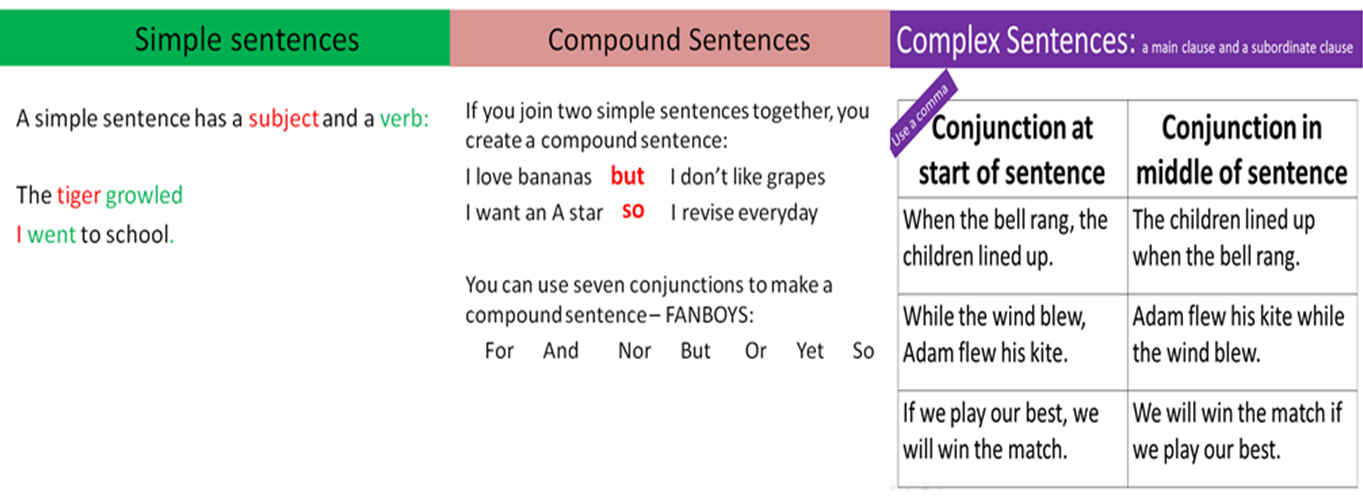
 Although it rained a lot, they enjoyed themselves. (Complex)
In spite of or Despite the rain, they enjoyed themselves. (Simple)
Although it rained a lot, they enjoyed themselves. (Complex)
In spite of or Despite the rain, they enjoyed themselves. (Simple)
 The food was very hot. We could not eat it. (Compound)
The food was so hot that we could not eat it. (Simple)
The food was too hot to eat. (Complex)
The food was very hot. We could not eat it. (Compound)
The food was so hot that we could not eat it. (Simple)
The food was too hot to eat. (Complex)

 The Differences Between ‘Sein’ and ‘Haben’ in German
The Differences Between ‘Sein’ and ‘Haben’ in German
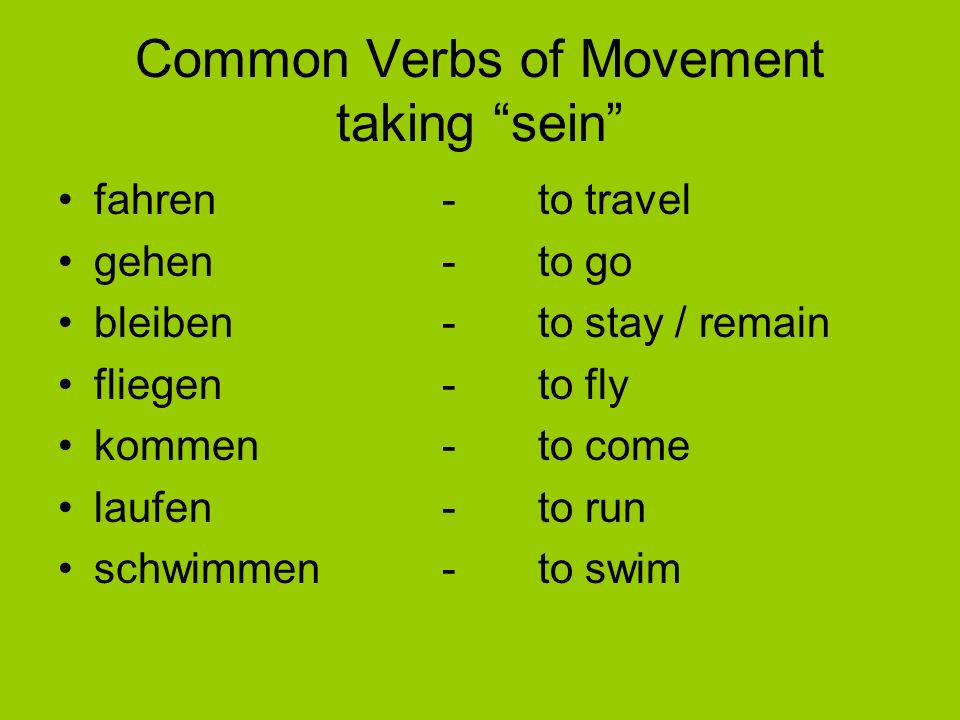
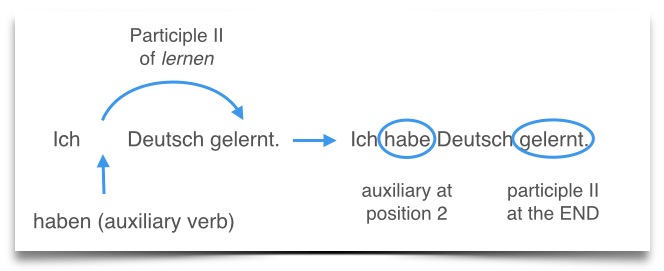


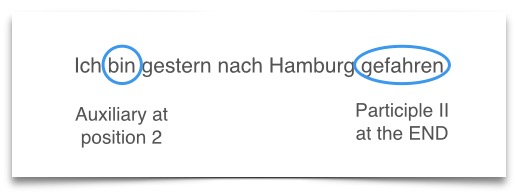
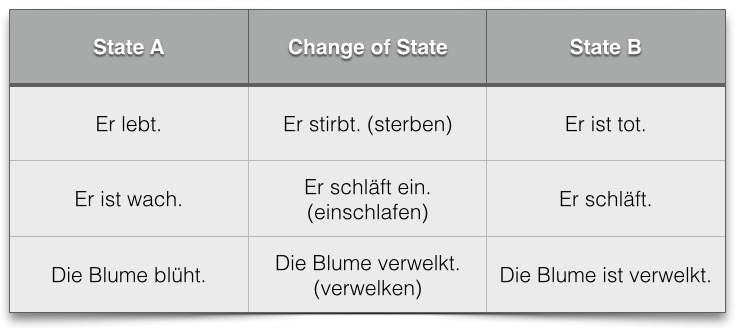
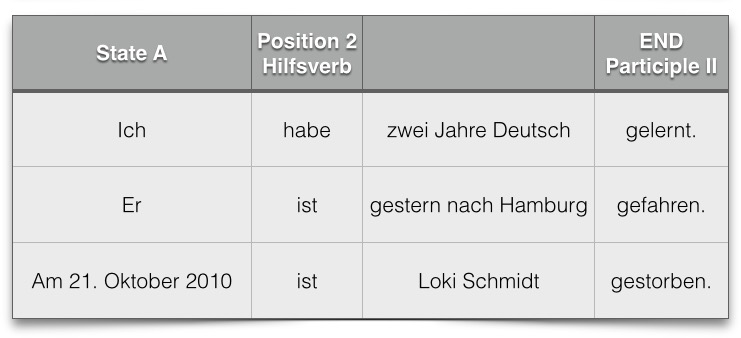
 Both conditions have to be met
Examples:
“Du hast geschlafen” (You have slept) Schlafen is intransitive, but it conveys neither motion nor a change of condition. For this reason “haben” is the auxiliary.“
Ich habe …geöffnet” (I have opened…)The verb “to open” conveys a change of condition and/or motion but the verb is transitive. Hence, the auxiliary is “haben”
If you are like most German language learners, you’ve probably come across the following dilemma when it comes to verbs in the perfect tense: “When do I use the verb haben (to have), when do I use sein (to be)?
This is a tricky question. Even though the usual answer is that most verbs use the auxiliary verb haben in the perfect tense (however watch for common exceptions stated below), sometimes both are used — depending on what part of Germany you’re from.
Both conditions have to be met
Examples:
“Du hast geschlafen” (You have slept) Schlafen is intransitive, but it conveys neither motion nor a change of condition. For this reason “haben” is the auxiliary.“
Ich habe …geöffnet” (I have opened…)The verb “to open” conveys a change of condition and/or motion but the verb is transitive. Hence, the auxiliary is “haben”
If you are like most German language learners, you’ve probably come across the following dilemma when it comes to verbs in the perfect tense: “When do I use the verb haben (to have), when do I use sein (to be)?
This is a tricky question. Even though the usual answer is that most verbs use the auxiliary verb haben in the perfect tense (however watch for common exceptions stated below), sometimes both are used — depending on what part of Germany you’re from.
 Customer service keywords:
Customer service keywords:
 10. STEP UP YOUR GAME: to start performing better
10. STEP UP YOUR GAME: to start performing better
 19. HANG IN THERE: wait and be patient
19. HANG IN THERE: wait and be patient
 32. A BAKER’S DOZEN: thirteen
32. A BAKER’S DOZEN: thirteen
 46. HIT THE BOOKS: to study very hard
46. HIT THE BOOKS: to study very hard

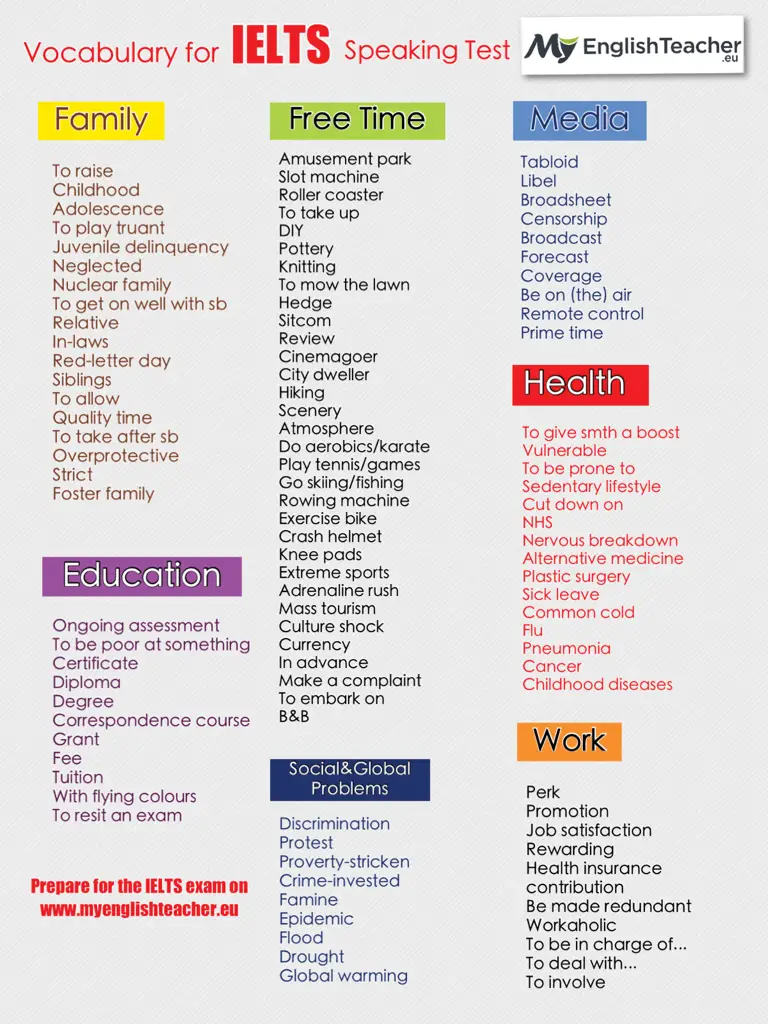 I for Imaginative
E for Excellent
L for Laid-back
T for Tuned-in
S for Smart.
Look at each word above and see how many SYNONYMS (words with the same meaning) can you think of?
Not many? It’s time to learn some new words and to revise the old ones. By the way, ’revise’ has a synonym I love: BRUSH UP. When I hear this word, I always visualize a large brush scrubbing my brain cells.
OK, let me give you a few examples:
I for Imaginative
E for Excellent
L for Laid-back
T for Tuned-in
S for Smart.
Look at each word above and see how many SYNONYMS (words with the same meaning) can you think of?
Not many? It’s time to learn some new words and to revise the old ones. By the way, ’revise’ has a synonym I love: BRUSH UP. When I hear this word, I always visualize a large brush scrubbing my brain cells.
OK, let me give you a few examples:
